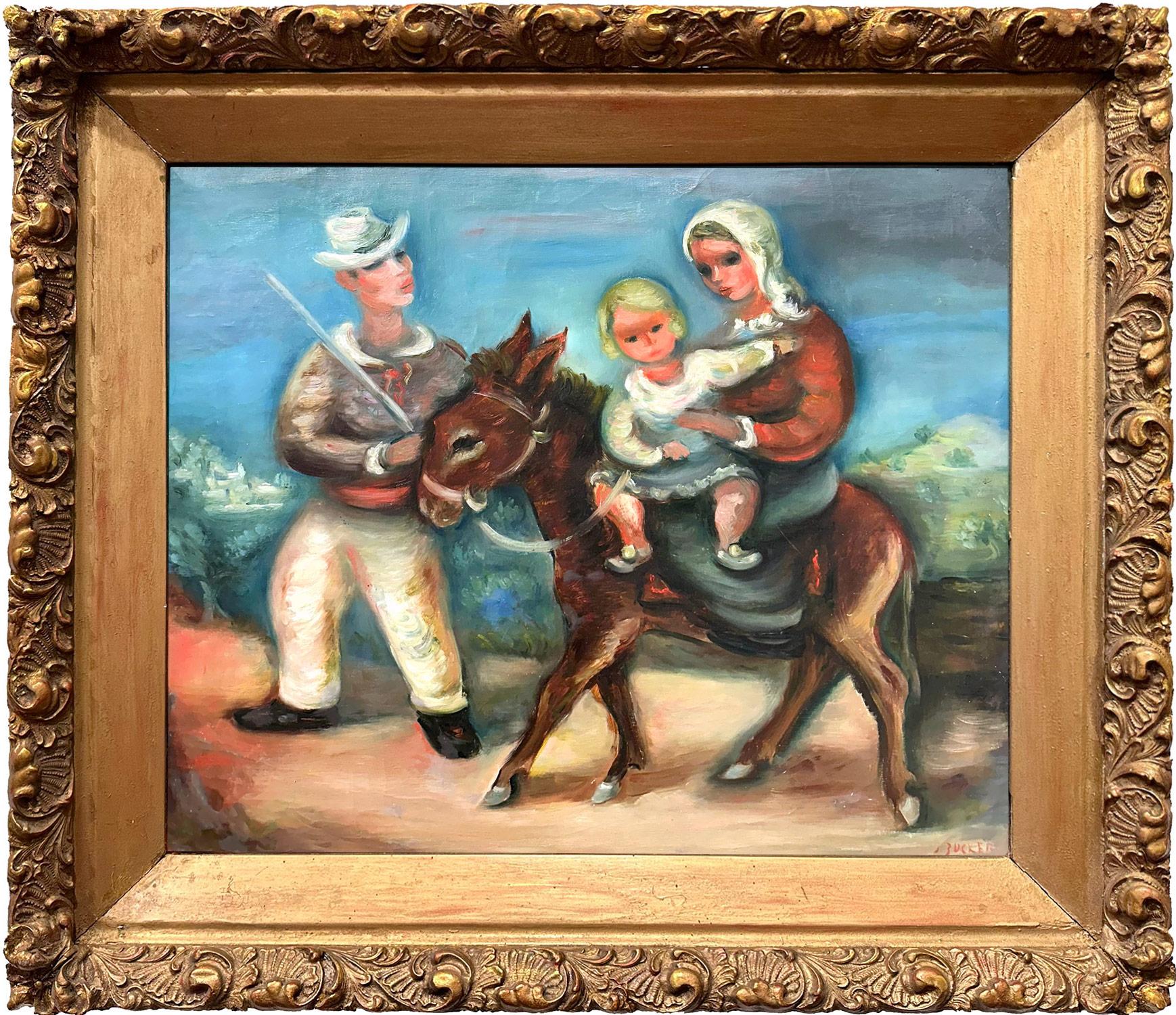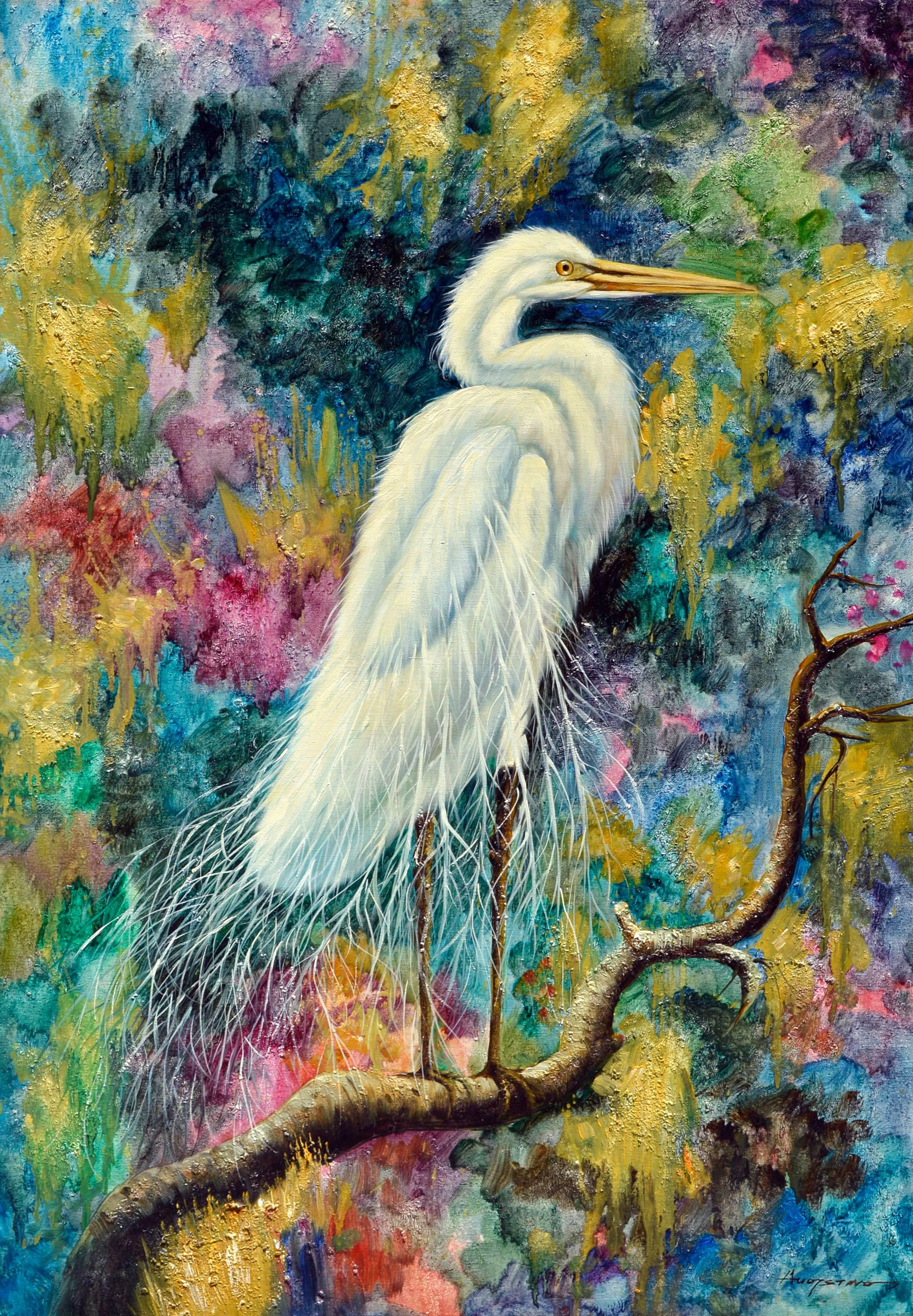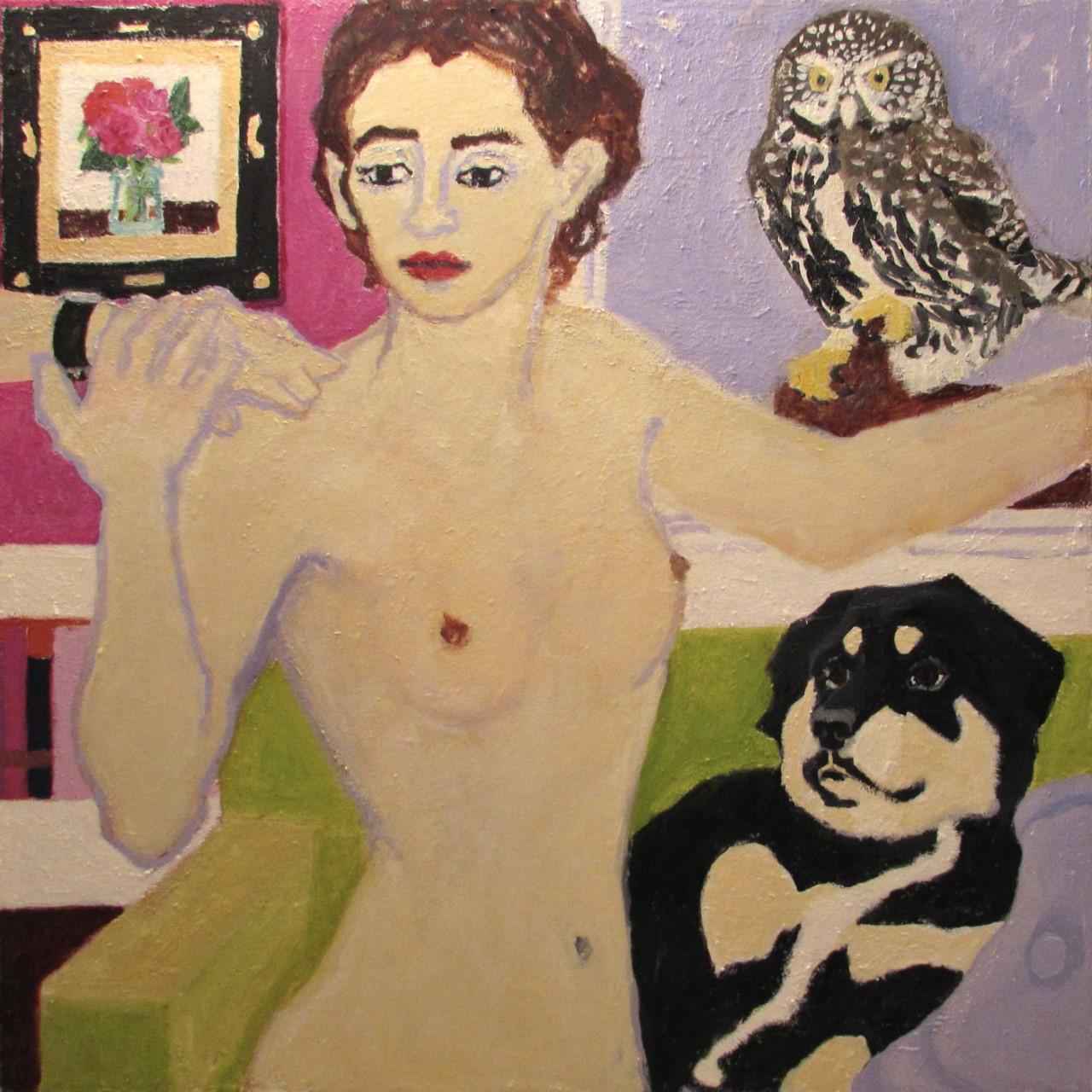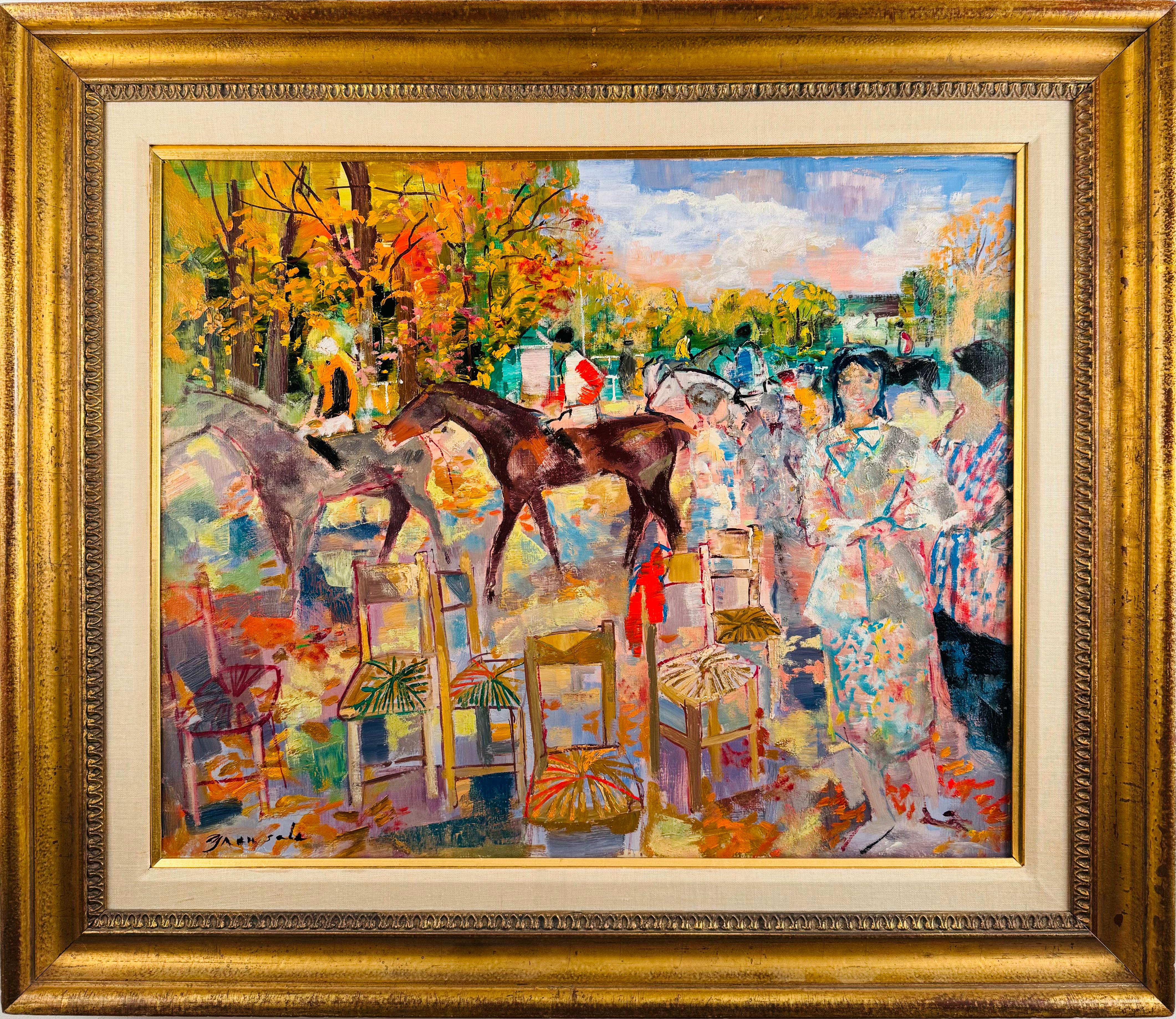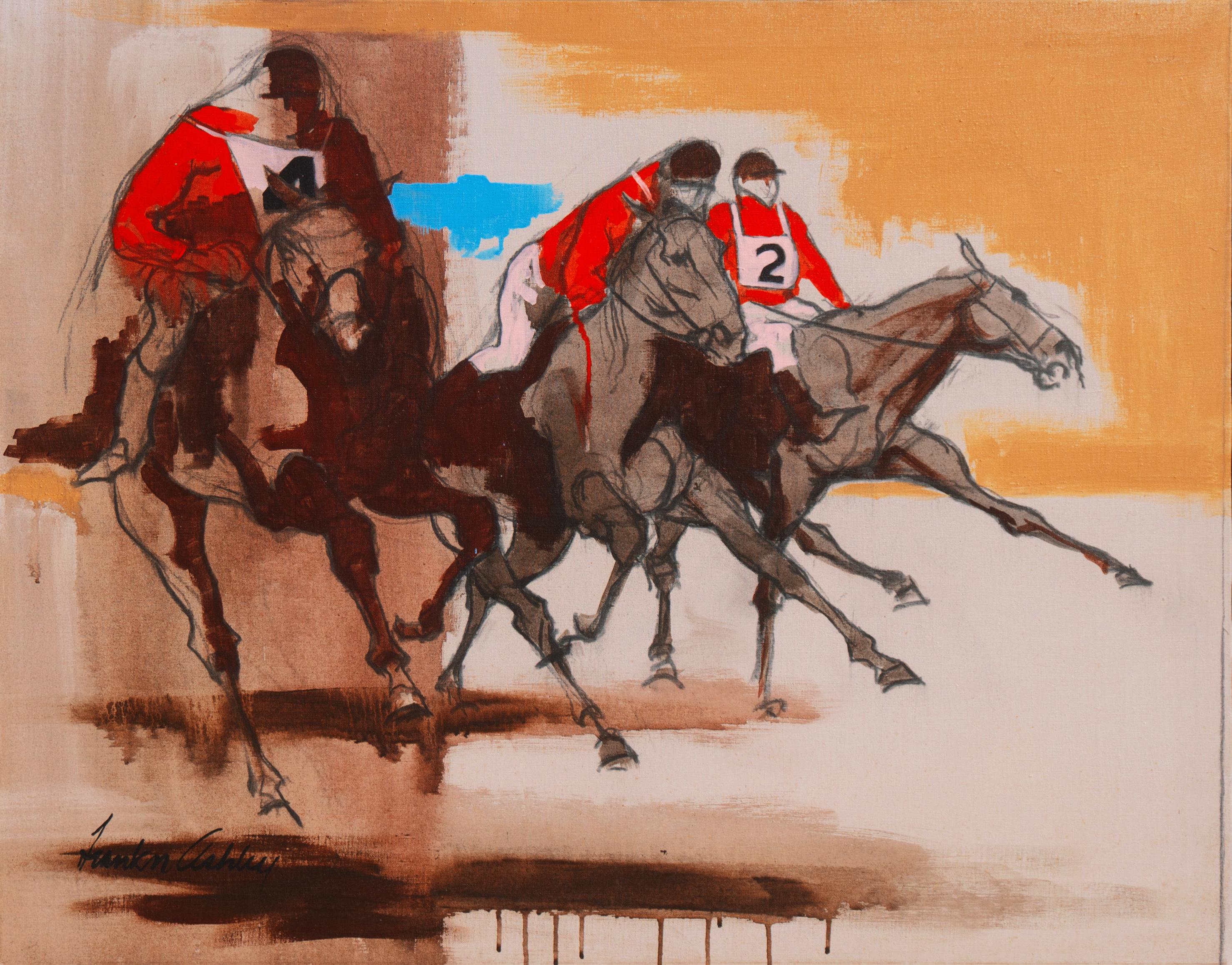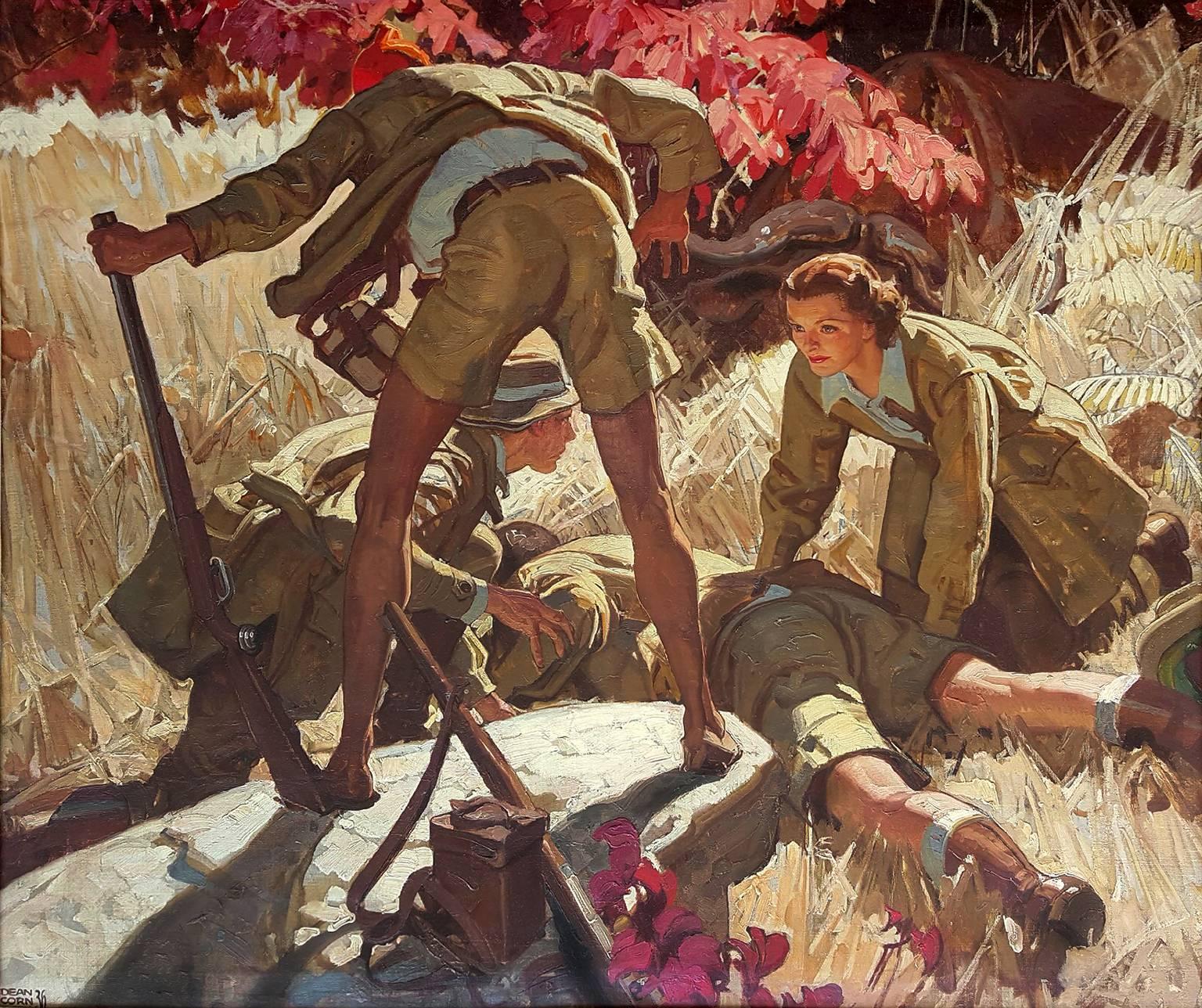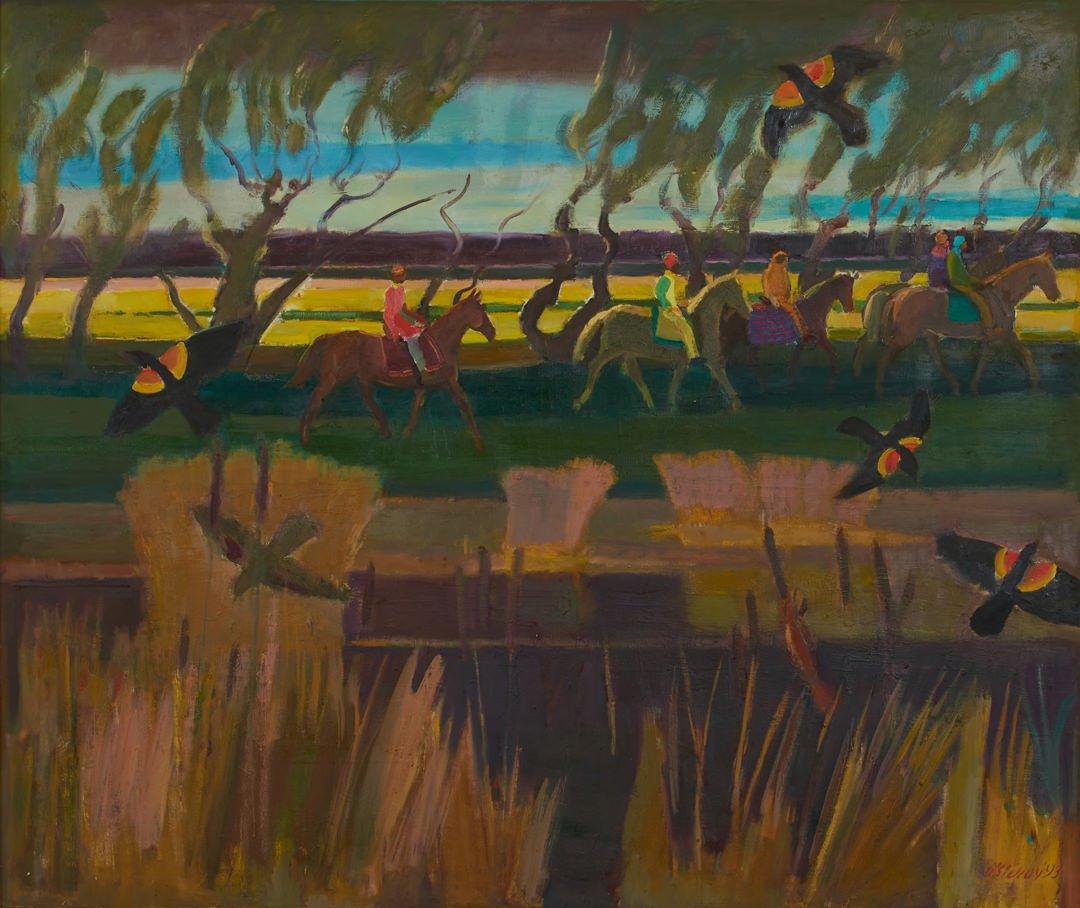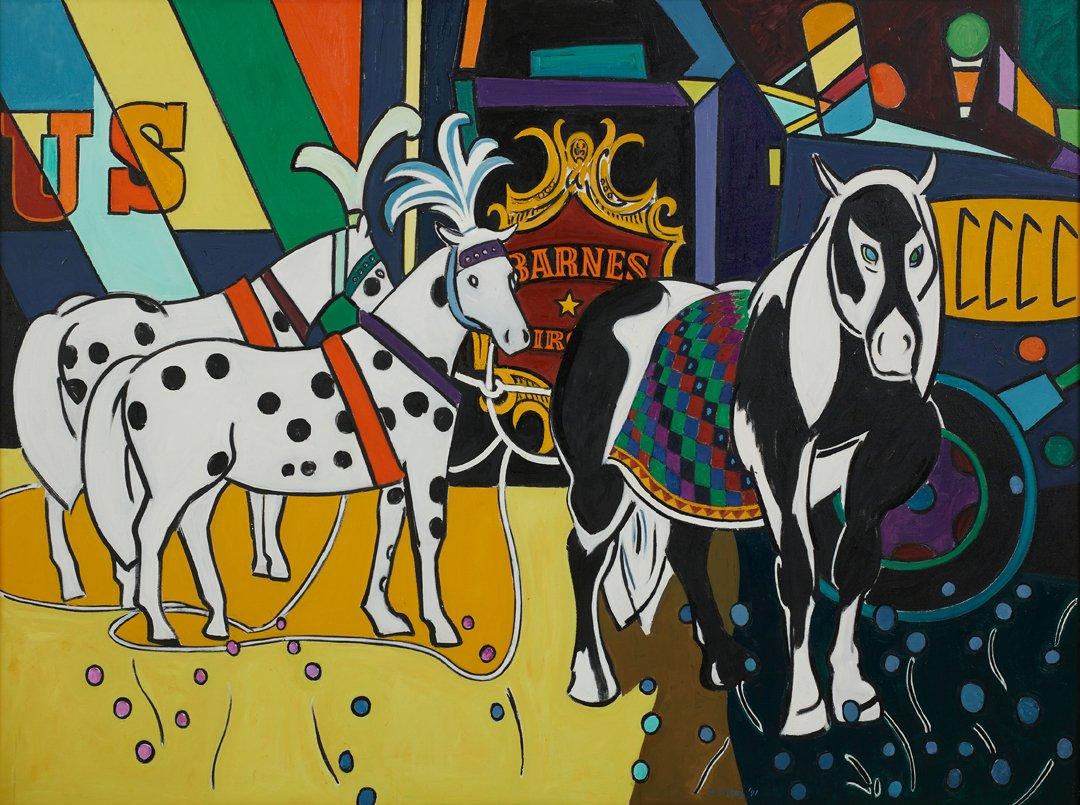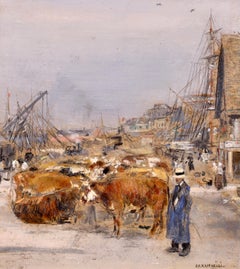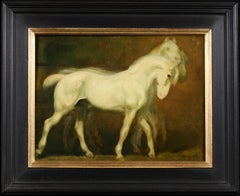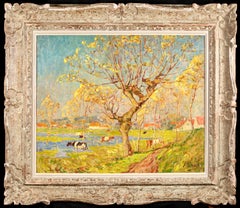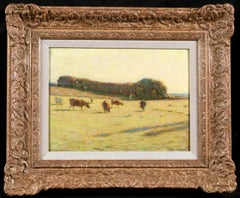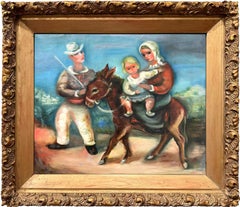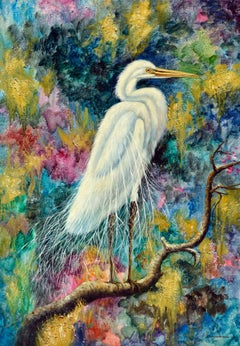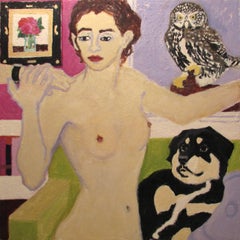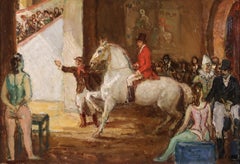
Au Cirque - Post Impressionist Oil, Figures & Horse at Circus by Marcel Cosson
View Similar Items
Want more images or videos?
Request additional images or videos from the seller
1 of 15
Jean-Louis-Marcel CossonAu Cirque - Post Impressionist Oil, Figures & Horse at Circus by Marcel Cossonc.1930
c.1930
About the Item
- Creator:Jean-Louis-Marcel Cosson (1878 - 1956, French)
- Creation Year:c.1930
- Dimensions:Height: 25 in (63.5 cm)Width: 32 in (81.28 cm)
- Medium:
- Movement & Style:
- Period:
- Condition:Very good original condition.
- Gallery Location:Marlow, GB
- Reference Number:Seller: LFA04731stDibs: LU415310955712
About the Seller
5.0
Platinum Seller
Premium sellers with a 4.7+ rating and 24-hour response times
Established in 2001
1stDibs seller since 2016
703 sales on 1stDibs
Typical response time: 1 hour
Authenticity Guarantee
In the unlikely event there’s an issue with an item’s authenticity, contact us within 1 year for a full refund. DetailsMoney-Back Guarantee
If your item is not as described, is damaged in transit, or does not arrive, contact us within 7 days for a full refund. Details24-Hour Cancellation
You have a 24-hour grace period in which to reconsider your purchase, with no questions asked.Vetted Professional Sellers
Our world-class sellers must adhere to strict standards for service and quality, maintaining the integrity of our listings.Price-Match Guarantee
If you find that a seller listed the same item for a lower price elsewhere, we’ll match it.Trusted Global Delivery
Our best-in-class carrier network provides specialized shipping options worldwide, including custom delivery.More From This Seller
View AllL'embarquement de boeufs - Impressionist Oil, Cattle by Jean Francois Raffaelli
By Jean-Francois Raffaelli
Located in Marlow, Buckinghamshire
Wonderful signed oil on panel cattle and figures in landscape by French impressionist painter Jean-Francois Raffaelli. The work depicts oxen being loaded onto ships in Honfleur, France en route to England.
Signature:
Signed lower right
Dimensions:
Framed: 18"x16"
Unframed: 9"x8"
Provenance:
Exhibition Jean Francois Raffaélli held at Galerie Simonson, 19 Rue Caumartin Paris - October 1929 (number 44)
Jean-François Raffaëlli's father was a failed Italian businessman and Raffaëlli himself was, among other things, a church chorister, actor and theatre singer. He then studied under Gérôme at the École des Beaux-Arts in Paris. He travelled to Italy, Spain and Algeria and on his return to France settled in Asnières.
In 1876, on a trip to Brittany, he first saw the potential of realist subject matter, if treated seriously. He became involved in meetings of artists at the Café Guerbois, where the Impressionist painters used to gather. As a result, Degas, contrary to the advice of the group, introduced Raffaëlli to the Impressionist exhibitions - according to one uncertain source as early as the very first exhibition, at the home of Nadar, and certainly to those of 1880 and 1881.
In 1904, Raffaëlli founded the Society for Original Colour Engraving. He first exhibited at the Salon de Paris in 1870 and continued to exhibit there until he joined the Salon des Artistes Français in 1881, where he earned a commendation in 1885, was made Chevalier of the Légion d'Honneur in 1889 and in the same year was awarded a gold medal at the Exposition Universelle. In 1906 he was made Officier of the Légion d'Honneur. He was also a member of the Société Nationale des Beaux-Arts. In 1884, a private exhibition of his work cemented his reputation.
He contributed to several newspapers such as The Black Cat (Le Chat Noir) in 1885 and The French Mail (Le Courrier Français) in 1886 and 1887. He published a collection entitled Parisian Characters, which captured his favourite themes of the street, the neighbourhood and local people going about their lives. In 1880 he participated, with Forain, on the illustration of Joris Karl Huysmans' Parisian Sketches (Croquis Parisiens). He also illustrated Huysman's Works. As well as working as an illustrator, he also made etchings and coloured dry-points.
His early attempts at painting were genre scenes, but once he was settled in Asnières he started to paint picturesque views of Parisian suburbs. From 1879 onwards, his subject matter drew on the lives of local people. These popular themes, which he treated with humanity and a social conscience, brought him to the attention of the social realist writers of the time such as Émile Zola. In addition to his realist style, Raffaëlli's dark palette, which ran contrary to the Impressionist aesthethic, helped to explain the opposition of those painters to his participation in their exhibitions. More concerned with drawing than colour, he used black and white for most of his paintings. Towards the end of his life, he lightened his palette, but without adopting any other principles of the Impressionist technique.
After painting several portraits, including Edmond de Goncourt and Georges Clémenceau, he returned to genre painting, particularly scenes of bourgeois life. Later in his career, he painted mainly Breton-inspired sailors and views of Venice. His views of the Paris slums and the fortifications, sites which have almost completely disappeared, went some way towards establishing a genre in themselves and perpetuated the memory of the area: The Slums, Rag-and-Bone Man, Vagabond, Sandpit, In St-Denis, Area of Fortifications. His realistic and witty portrayal of typical Parisian townscapes accounts for his enduring appeal.
Born in Paris, he was of Tuscan descent through his paternal grandparents. He showed an interest in music and theatre before becoming a painter in 1870. One of his landscape paintings was accepted for exhibition at the Salon in that same year. In October 1871 he began three months of study under Jean-Léon Gérôme at the École des Beaux-Arts in Paris; he had no other formal training.
Raffaëlli produced primarily costume pictures until 1876, when he began to depict the people of his time—particularly peasants, workers, and ragpickers seen in the suburbs of Paris—in a realistic style. His new work was championed by influential critics such as J.-K. Huysmans, as well as by Edgar Degas.
The ragpicker became for Raffaëlli a symbol of the alienation of the individual in modern society. Art historian Barbara S. Fields has written of Raffaëlli's interest in the positivist philosophy of Hippolyte-Adolphe Taine, which led him to articulate a theory of realism that he christened caractérisme. He hoped to set himself apart from those unthinking, so-called realist artists whose art provided the viewer with only a literal depiction of nature. His careful observation of man in his milieu paralleled the anti-aesthetic, anti-romantic approach of the literary Naturalists, such as Zola and Huysmans.
Degas invited Raffaëlli to participate in the Impressionist exhibitions of 1880 and 1881, an action that bitterly divided the group; not only was Raffaëlli not an Impressionist, but he threatened to dominate the 1880 exhibition with his outsized display of 37 works. Monet, resentful of Degas's insistence on expanding the Impressionist exhibitions by including several realists, chose not to exhibit, complaining, "The little chapel has become a commonplace school which opens its doors to the first dauber to come along."An example of Raffaëlli's work from this period is Les buveurs d'absinthe (1881, in the California Palace of Legion of Honor Art Museum in San Francisco). Originally titled Les déclassés, the painting was widely praised at the 1881 exhibit.
After winning the Légion d'honneur in 1889, Raffaëlli shifted his attention from the suburbs of Paris to city itself, and the street scenes that resulted were well received by the public and the critics. He made a number of sculptures, but these are known today only through photographs.[2] His work was also part of the painting event in the art competition at the 1912 Summer Olympics. In the later years of his life, he concentrated on color printmaking. Raffaëlli died in Paris on February 11, 1924
Museum and Gallery Holdings:
Béziers: Peasants Going to Town
Bordeaux: Bohemians at a Café
Boston: Notre-Dame; Return from the Market
Brussels: Chevet of Notre-Dame; pastel
Bucharest (Muz. National de Arta al României): Market at Antibes; Pied-à-terre
Copenhagen: Fishermen on the Beach
Douai: Return from the Market; Blacksmiths
Liège: Absinthe Drinker...
Category
1880s Impressionist Animal Paintings
Materials
Oil, Panel
Les Trois Chevaux - Modernist Animal Oil Painting by Louis Anquetin
By Louis Anquetin
Located in Marlow, Buckinghamshire
Signed oil on panel circa 1895 by French modernist painter Louis Anquetin. The piece depicts three white horses.
Signature:
Signed lower right
Dimensions:
Framed: 16.5"x20"
Unframe...
Category
1890s Modern Animal Paintings
Materials
Oil, Panel
Radiant Autumn -Wakken - Post Impressionist Oil, Cows in Landscape - Modest Huys
Located in Marlow, Buckinghamshire
Signed and dated divisionist landscape oil on canvas by Belgian post impressionist painter Modest Huys. This stunning piece is titled "Radiant Autumn - Wak...
Category
Early 20th Century Post-Impressionist Landscape Paintings
Materials
Canvas, Oil
Effets de lumiere dans le pre - Post Impressionist Landscape Oil by H Le Sidaner
By Henri Le Sidaner
Located in Marlow, Buckinghamshire
Signed post impressionist animals in landscape oil on board by French painter Henri Le Sidaner. This stunning piece depicts cattle in a field. The sun is starting to set casting blue...
Category
1890s Post-Impressionist Landscape Paintings
Materials
Oil, Board
A Sussex Farm - Fauvist Landscape Oil Painting by Robert Polhill Bevan
By Robert Polhill Bevan
Located in Marlow, Buckinghamshire
Fauvist oil on board landscape circa 1905 by British painter Robert Polhill Bevan. The piece depicts a view of farm in Sussex. The red-roofed farmhouses are nestled between lush gree...
Category
Early 1900s Fauvist Landscape Paintings
Materials
Oil, Board
Murols sous la neige - Post Impressionist Landscape Oil by Victor Charreton
By Victor Charreton
Located in Marlow, Buckinghamshire
Signed figure in winter landscape oil on canvas circa 1915 by French Post Impressionist painter Victor Charreton, who was known as the painter of colours. The work depicts a man stro...
Category
1910s Post-Impressionist Landscape Paintings
Materials
Oil, Canvas
You May Also Like
"The Holy Family" Post-Impressionist Pastoral & Figures Oil Painting on Canvas
By Jacques Zucker
Located in New York, NY
A charming oil painting depicting a classical religious scene of the Holy Family journey done in a highly impressionistic manner with unique colors and expressions with the use of br...
Category
20th Century Post-Impressionist Figurative Paintings
Materials
Canvas, Oil
The Fauvist White Egret
By Augostino
Located in Soquel, CA
Fauvist style White Egret by Augostino (American, 20th Century). Modernist/Realist adaptation of a familiar theme. One small tear repaired professionally. ...
Category
1970s Fauvist Animal Paintings
Materials
Canvas, Oil
"A Touch Of Intimacy" by Betsy Podlach - Fauvist Figurative Nude Oil Painting
By Betsy Podlach
Located in Carmel, CA
Betsy Podlach (American, born 1964)
"A Touch of Intimacy" 2023
Oil Paint, Canvas, Stretcher Bars
The artist signed the back of the painting.
A Touch of Intimacy" is an evocative pai...
Category
2010s Fauvist Figurative Paintings
Materials
Canvas, Oil, Stretcher Bars
Woman and Cat in the Sun oil on canvas painting
Located in Barcelona, Barcelona
Artist: Josep Maria Rosselló i Virgili
Title: Woman and Cat in the Sun
Technique: Oil on canvas
Dimensions: 13 x 16 in (without frame) 16 x 19.3 in (with frame)
Date: 1980s
Conditio...
Category
1990s Fauvist Figurative Paintings
Materials
Canvas, Oil
$812 Sale Price
30% Off
“Paddock, 1961”, 20th Century Oil on Canvas by Spanish Artist Emilio Grau Sala
By Emilio Grau Sala
Located in Madrid, ES
EMILIO GRAU SALA
Spanish, 1911 - 1975
PADDOCK, 1961
signed "Grau Sala" (lower right)
signed again, titled & dated "GRAU SALA / PADDOK / 1961" (on the reverse)
oil on canvas
21-3/8 x ...
Category
1960s Post-Impressionist Figurative Paintings
Materials
Canvas, Oil
Milly With Minstrel Children And Their Childhood Pony In Dappled Summer Sunlight
Located in Sutton Poyntz, Dorset
Harold Walton Freckleton.
English ( b.1890 - d.1979 ).
Milly With Minstrel.
Oil On Canvas.
Signed Lower Right.
Image size 24.4 inches x 29.52 inches ( 62cm x 75cm ).
Frame size 30.7 inches x 35.8 inches ( 78cm x 91cm ).
Available for sale; this original oil painting is by the Nottingham artist Harry Freckleton and dates from the 1960s.
The painting is presented and supplied in its’ original wooden frame (which is shown in these photographs).
The frame, canvas and the painted surface have benefitted from cleaning, restoration and conservation, which was performed on our instruction, supervision and approval. The original cotton covered slip has been replaced.
This vintage painting is now in very good condition, defying its age. It wants for nothing and is supplied ready to hang and display.
The painting is signed lower right.
The acclaimed artist Harry Freckleton was born in Nottingham in 1890 and lived there for most of his life. He studied at the Nottingham School of Arts, as it was then known, from 1904 to 1912 under Wilson Foster and was much influenced by the local painter Arthur Spooner. He worked as a lithograph artist, and then served in the army during World War 1. He then worked as an artist for New Zealand Cine Studios and went on to run his own photographic business from 1924-65.
Freckleton married the artist Vera Freckleton and they spent most of their married life living in at Whitegates in The Park, Nottingham.
Most of Freckleton’s art is painted in oils, and he specialised in still life, landscape and figurative work, especially childhood scenes. His best works have a strong human interest, with an individual technique showing quality and fine execution. He was a member of the Nottingham Society of Artists, exhibiting there and becoming an esteemed Associate. As a successful artist Freckleton exhibited work seven times at the Royal Academy, as well as the Royal Society of Portrait Painters and the Royal Society of British Artists. His work continues to be sought-after and is today represented in permanent collections in Nottingham, Blackpool, Huddersfield and elsewhere.
© Big Sky Fine Art
This beautiful oil on canvas painting by Harry Freckleton shows a scene in an English farmyard. Besides an old green painted barn and a tall haystack, we see Minnie, a young girl sitting astride Minstrel, her brown pony. She is wearing a riding hat, white blouse and red trousers, and looks down at her left side towards a second figure, in a blue top and tan trousers, who is possibly adjusting her stirrups. A third figure, another girl, in grey blouse...
Category
Mid-20th Century Post-Impressionist Animal Paintings
Materials
Canvas, Oil
Recently Viewed
View AllMore Ways To Browse
Vintage Circus Horse
Vintage Black And White Clown
French Clown Oil Painting
Circus Stand
1930 Clown
The Painter In The Red Jacket
Opera Hat
Vintage Circus Dresses
Clown On Horse
Painted Jean Jacket
Vintage Clown Hat
Vintage Circus Ringmaster
Theatrical Light
Dual Face
King David Painting
Van Go Painting
Syrian Paintings
Candle Painting
